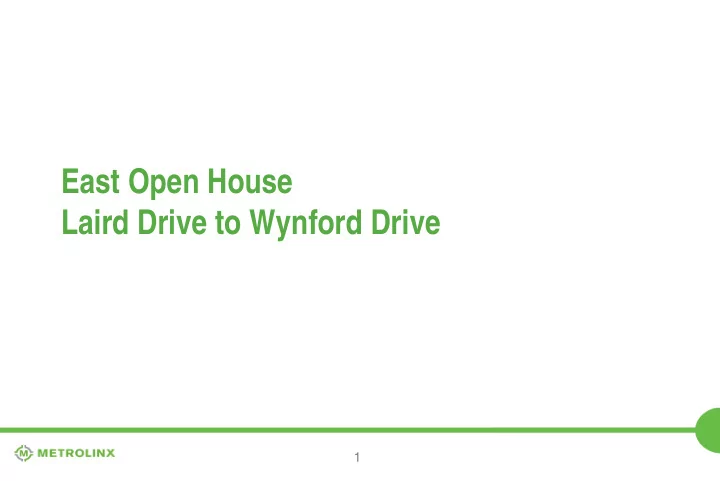

East Open House Laird Drive to Wynford Drive 1
East Tunnel Construction Timeline Contract award Construction of launch shaft – 1 year Utility relocation at headwalls Construction of headwalls – 6 to 8 months Construction of extraction shaft at Yonge Street 2
Tunnel Boring Machine The construction of new tunnels under Eglinton Avenue is done by tunnel boring machines (TBMs). Each TBM moves forward by pushing off against concrete segments. The operator advances the machine as soil is removed from the TBM face through a conveyor system. The launch pit remains active for removal of muck/spoils. 3
Launch of the Tunnel Boring Machine The Eglinton Crosstown tunnel will consist of side-by- side or twin tunnels. Each tunnel will be 6.75 metres internal diameter. Initially, one machine will begin excavation; the other will follow on a parallel course soon after. 4
Launch Shaft Operations To keep the tunnel safe for the crew a ventilation system pumps fresh air into the tunnel and exhaust air is moved out of the tunnel. Cranes remain in position during the mining operation; muck will be hauled out and new concrete tunnel segments will be delivered. 5
Tunnelling Begins Tunnel boring machines work beneath Eglinton Avenue. Business activities and traffic will continue with this method. A single TBM will tunnel 75 metres per week. Each machine is capable of moving 500 cubic metres of earth per day. The machines are made in Toronto by Caterpillar Tunneling Canada Corporation, formerly LOVAT, a world leader in tunnel boring machine manufacturing. 6
East Tunnels Launch Shaft To Leslie To Brentcliffe 7
Overview: Design Excellence at Metrolinx Design excellence at Metrolinx refers to the successful interplay between: Functionality Durability Beauty Value 8
Crosstown Principles of Design Excellence 1. A strong conceptual narrative vision across the system 2. Design that elevates the quality of the public transit experience 3. Civic caliber and scale of built form and materials 4. Clarity and simplicity of architectural expression through integrated design of building systems and elements 5. Responsiveness to contextual, local and future conditions 9
1. A Strong Conceptual Narrative Vision across the System A coherent and unified architectural strategy for the entire Crosstown line Clear strategy for consistent and variable elements 10
2. Design that Elevates the Quality of the Public Transit Experience Openness through optimal spatial Optimized daylight penetration penetration 11
3. Civic Calibre and Scale of Built Form and Materials Unified ground plane inside and Civic materials and character of open outside stations and at stops spaces 12
4. Clarity and Simplicity of Architectural Expression through Integrated Building Systems and Elements Integrated structural, mechanical, A clear hierarchy and plan for and electrical systems user-centred integrated information 13
5. Responsiveness to Contextual, Local and future Conditions Integration with historic elements Sustainability measures 14
Crosstown Accessible Features: Stations Accessible path from street to platform Accessible routes identified Station attendant Platform edge tactile strip Wayfinding tiles on platforms Near level boarding of trains Platform edge illumination Audible messages throughout stations Signage with accessible features Designated Waiting Area Colour contrast between station walls and floors Equipment mounted at accessible heights Benches 15
Crosstown Accessibility Features: Stops Platform edge tactile strip Platform edge illumination Colour contrast at between walls and platform Equipment mounted at accessible heights Sheltered benches Sheltered wheelchair area Passenger assistance intercom Ramp access to platforms Signage with accessible features 16
Laird Station Local Context: Demand 17
Laird Station Local Context: Land Use 18
Laird Station Profile View 19
Laird Station Longitudinal Section 20
Laird Station Main Entrance 21
Laird Station Secondary Entrance 22
Brentcliffe Portal 23
East Portal and Don West Bridge East Portal Don West River Bridge 24
Leslie Stop Local Context: Demand Wynford Stop Ferrand Stop Don Mills Station Leslie Stop Laird Station 25
Leslie Stop Local Context: Pedestrian Flow 26
CP Rail bridge 27
Don Mills Station Local Context: Demand 28
Don Mills Station Local Context: Land Use 29
Don Mills Station Primary Entrance 30
Don Mills Station Secondary Entrance 31
Don Mills Station Longitudinal Section 32
Ferrand Portal Portal 33
Wynford Stop Local Context: Pedestrian Flow 34
Wynford Wynford Stop as Proposed in the RCD Final Stop Configuration to be determined during Detail Design Wynford Stop as Proposed in the EA 35
New Approach: Alternative Financing and Procurement (AFP) Public Private Partnership models have been underway in Canada for 20 years 165 projects 21 transportation projects $51 billion total project value Canada-wide examples Canada Line rapid transit project (Vancouver) Autoroute 25 (Montréal) Trans-Canada Highway (Atlantic Canada) Ontario examples Pan Am games athletes village Ottawa Light Rail Transit Highway 407 East Phase 1 The Rt. Hon. Herb Gray Parkway (Formerly the Windsor Essex Parkway 36
Owner’s Role Changes with AFP 37
New Approach: Advantages of (AFP) Increased capacity to bring projects to market Transfer of risk Appropriate risks transferred to private sector to ensure “on time, on budget” delivery and offer value for money Design, construction, cost escalation, schedule delays, operations, maintenance, life cycle, financial risk Cost certainty Optimal cost combination: combines capital, maintenance and life cycle costs Integration of design and construction 38
New Approach: Roles and Responsibilities in the Design Build Finance Maintain model Metrolinx Role: Design Finance Overall scope (inclusion of maintenance, Project Budget operations, etc.) With Infrastructure Ontario run a competitive Project-Specific Output Specifications procurement process; select the winning (with Consultant team) contractor Real Estate Acquisition (with City of Maintain Toronto) Testing & Commissioning (with Toronto Build Transit Commission) Oversee Construction Phase Safety Certification and Project Acceptance Quality Assurance TTC to operate Integrated with existing TTC system 39
Recommend
More recommend